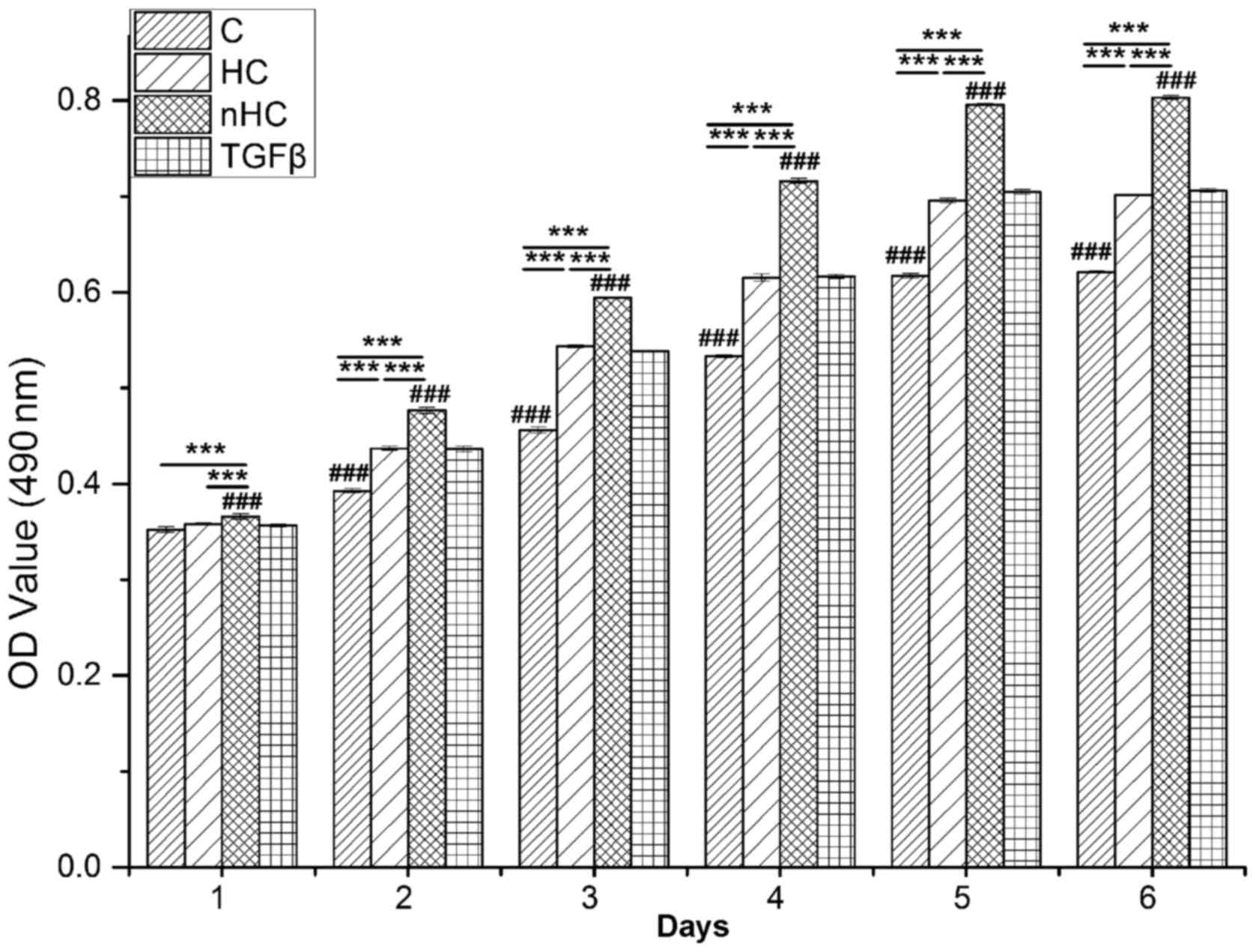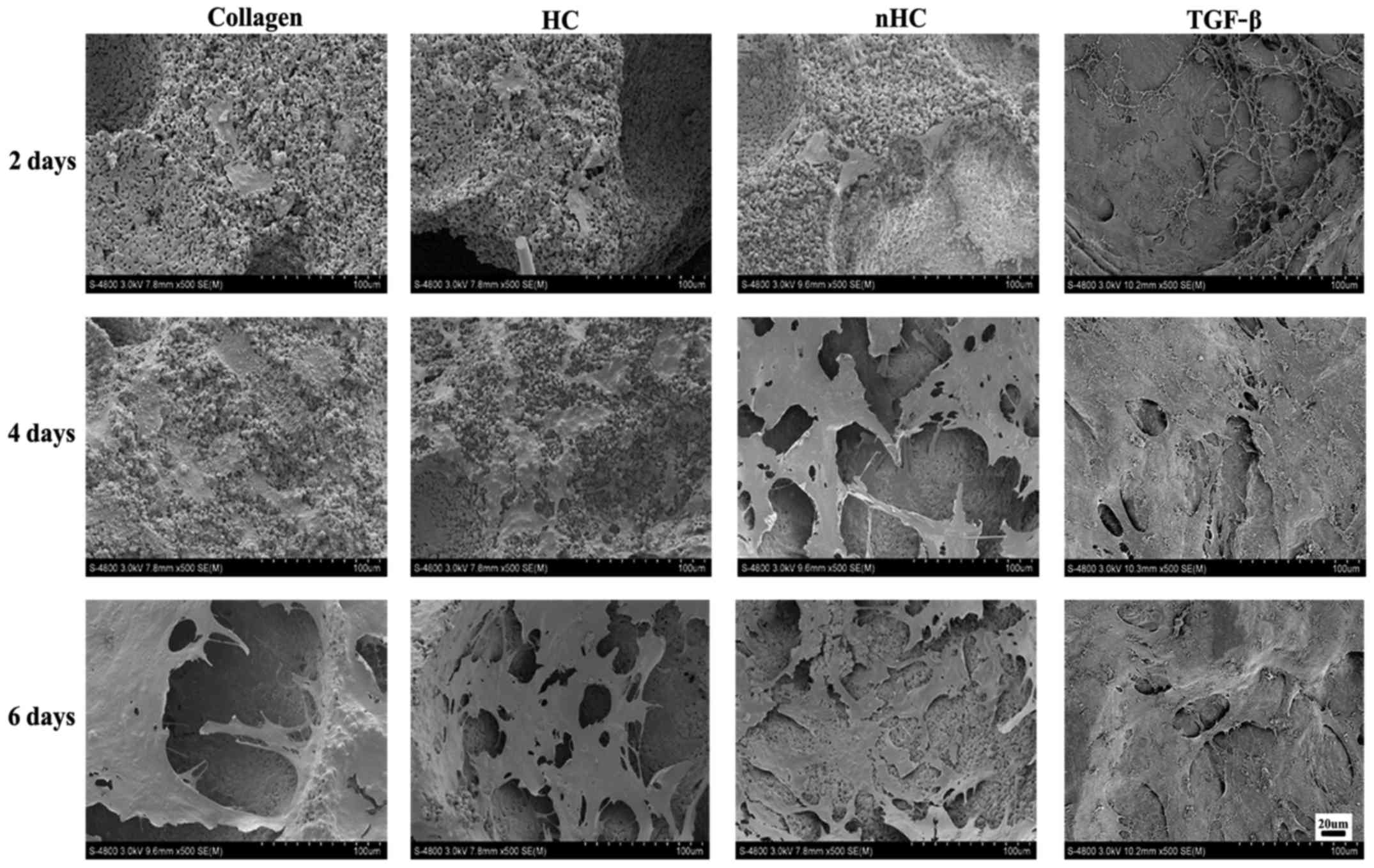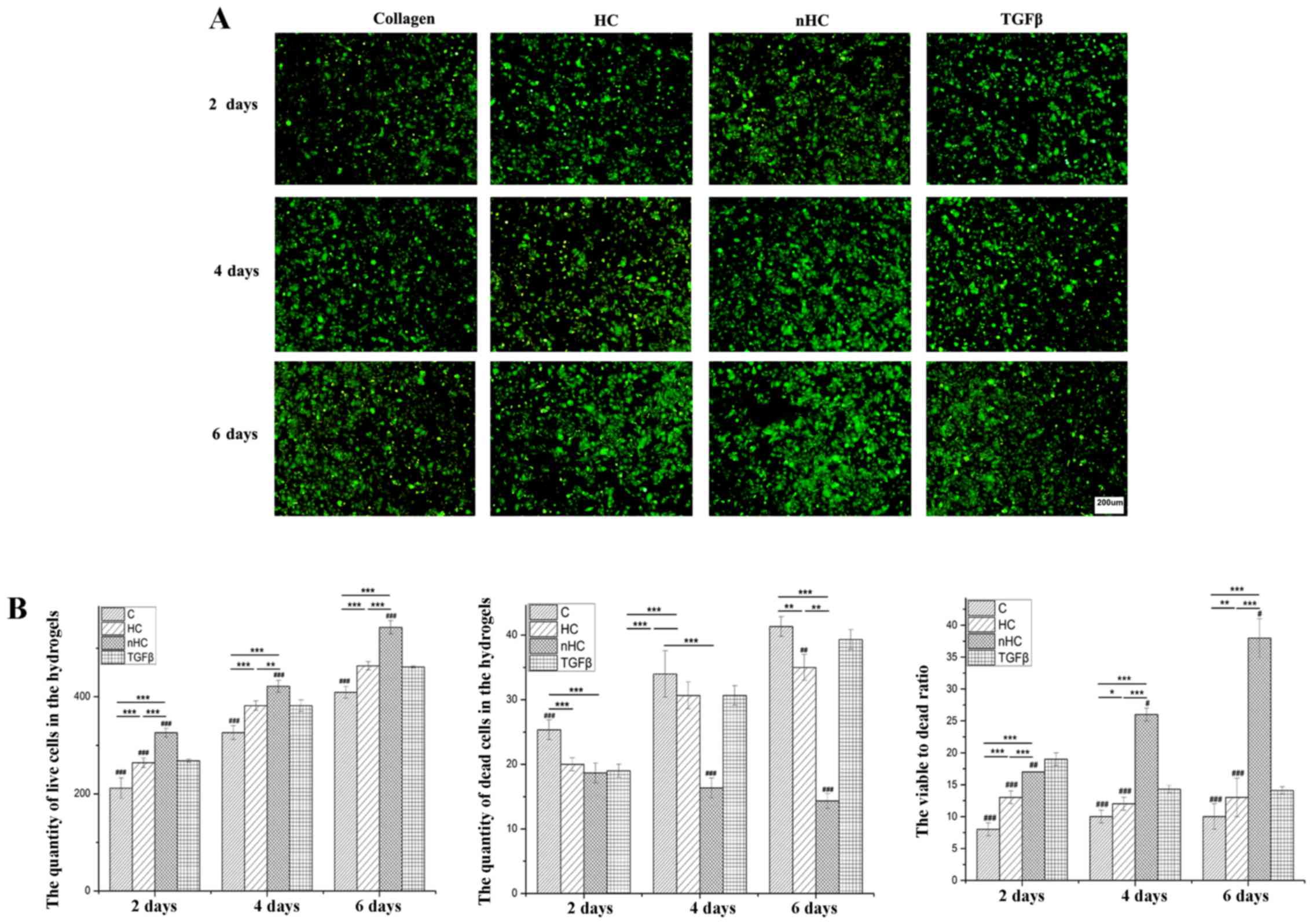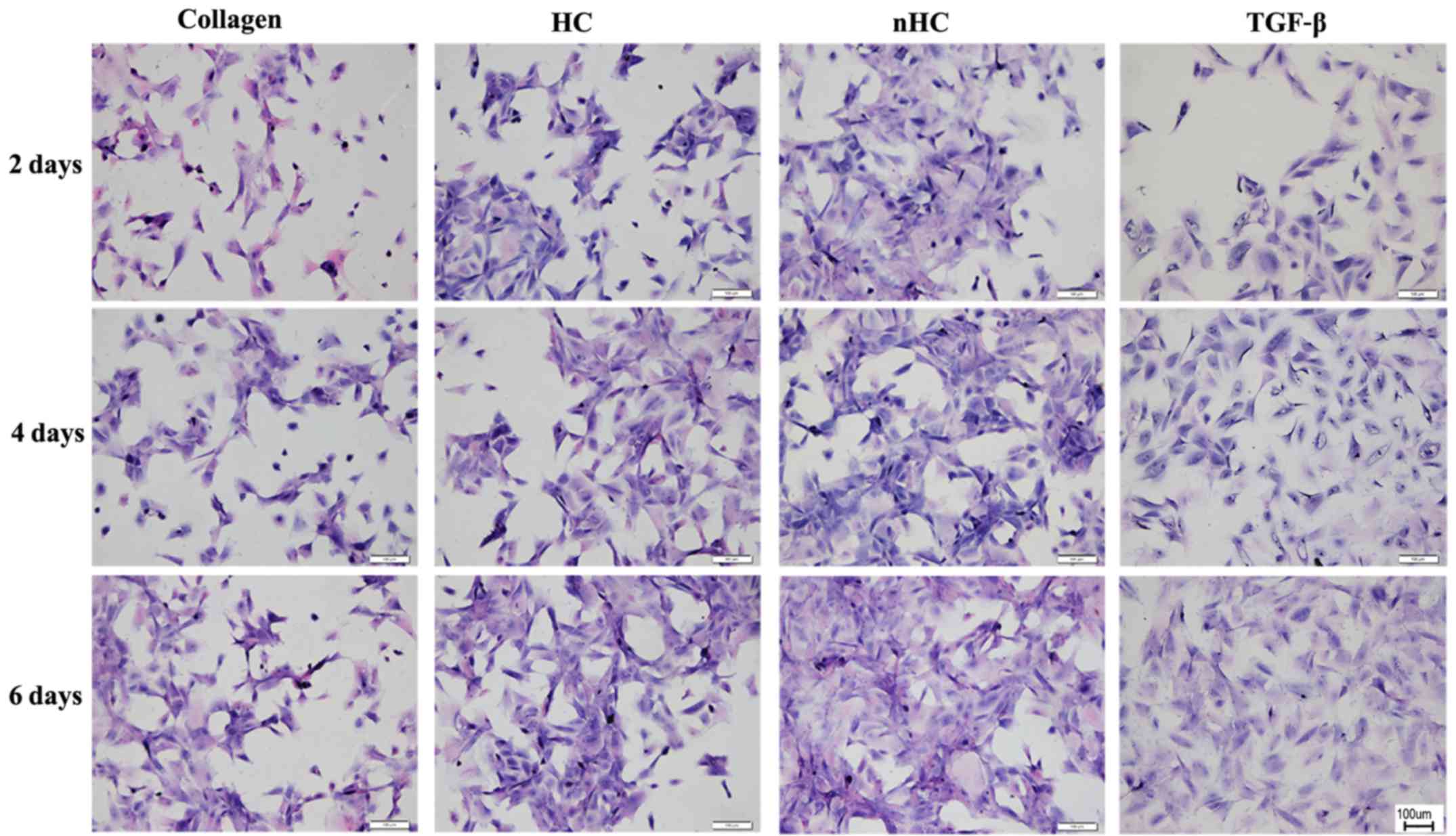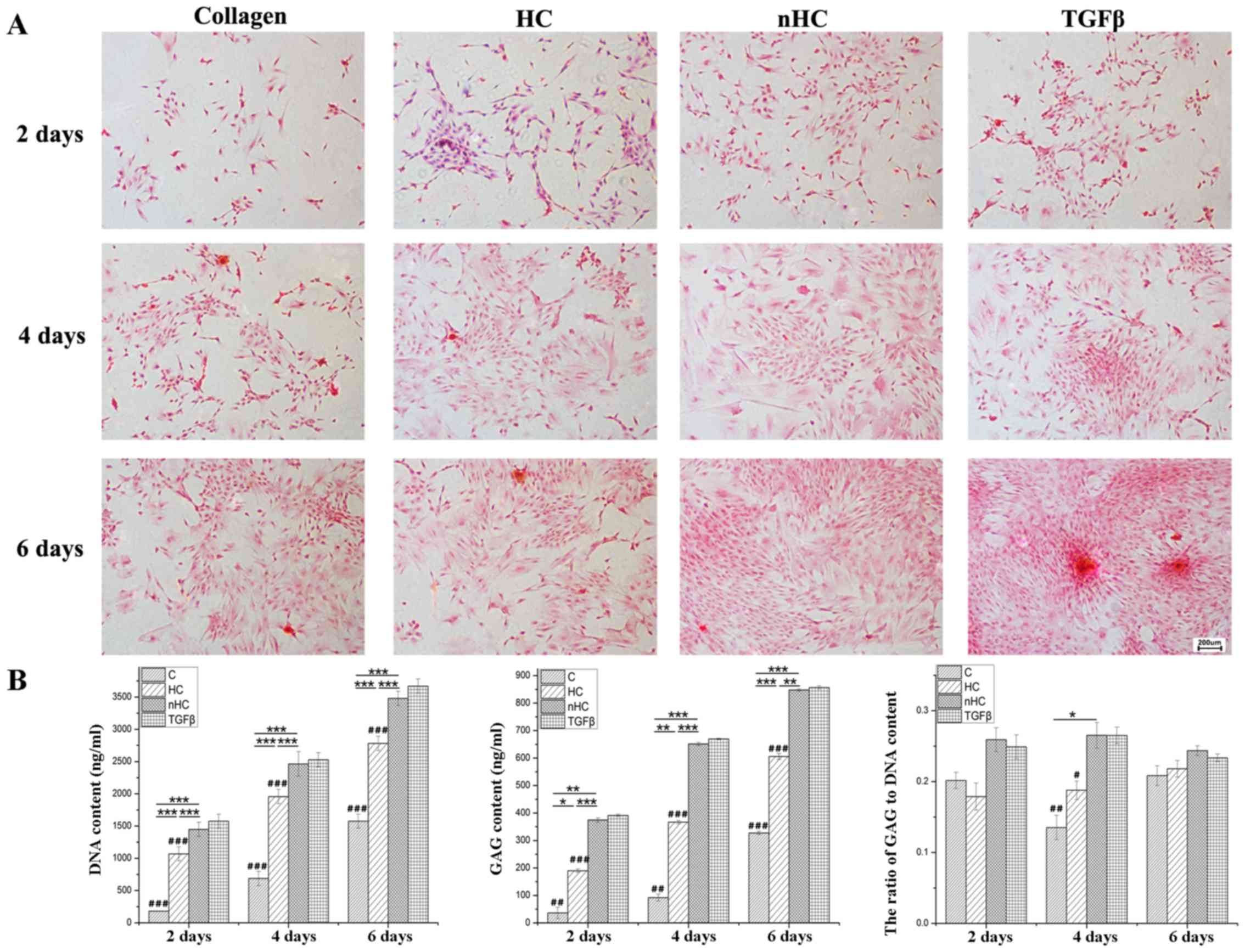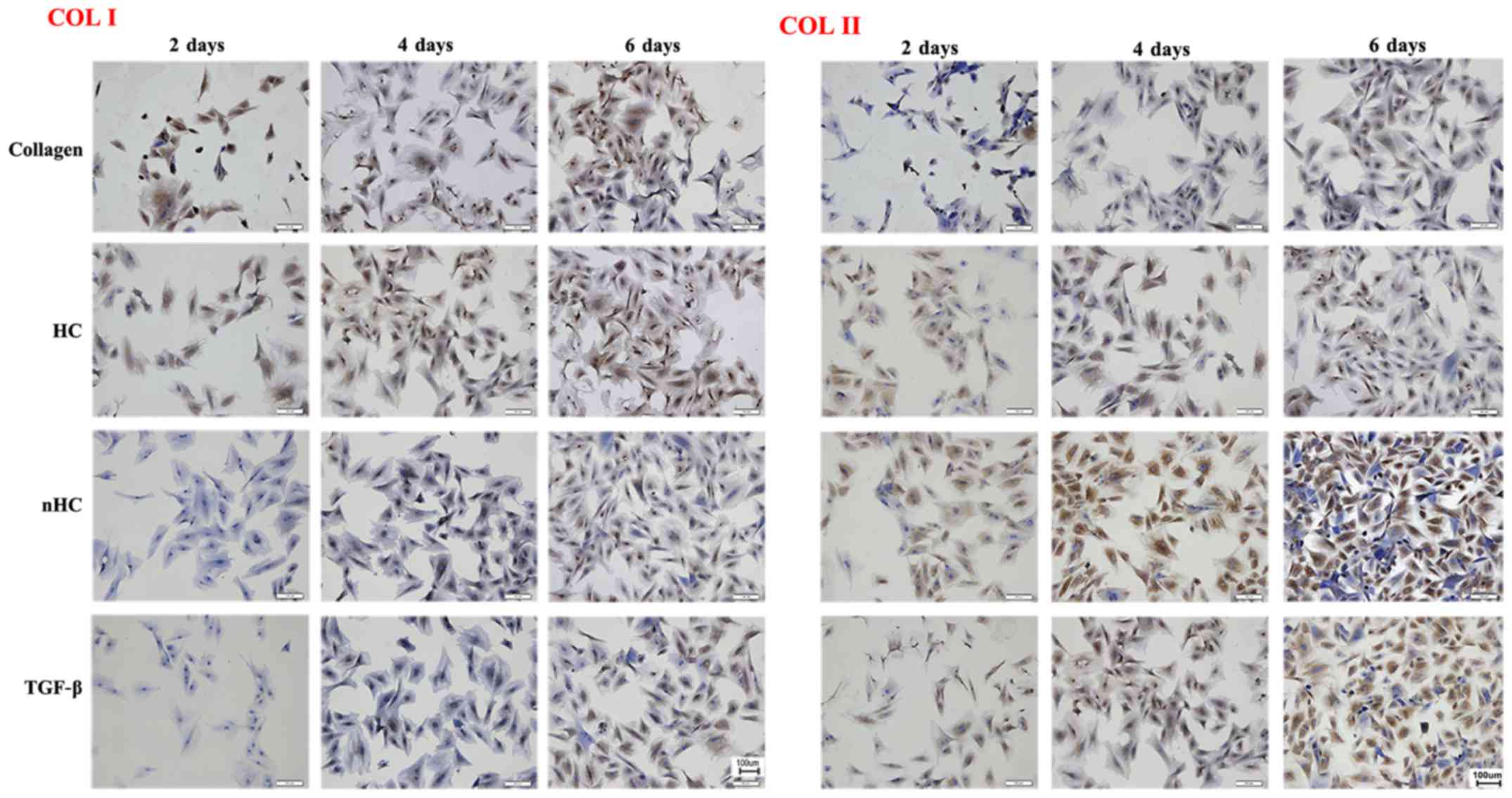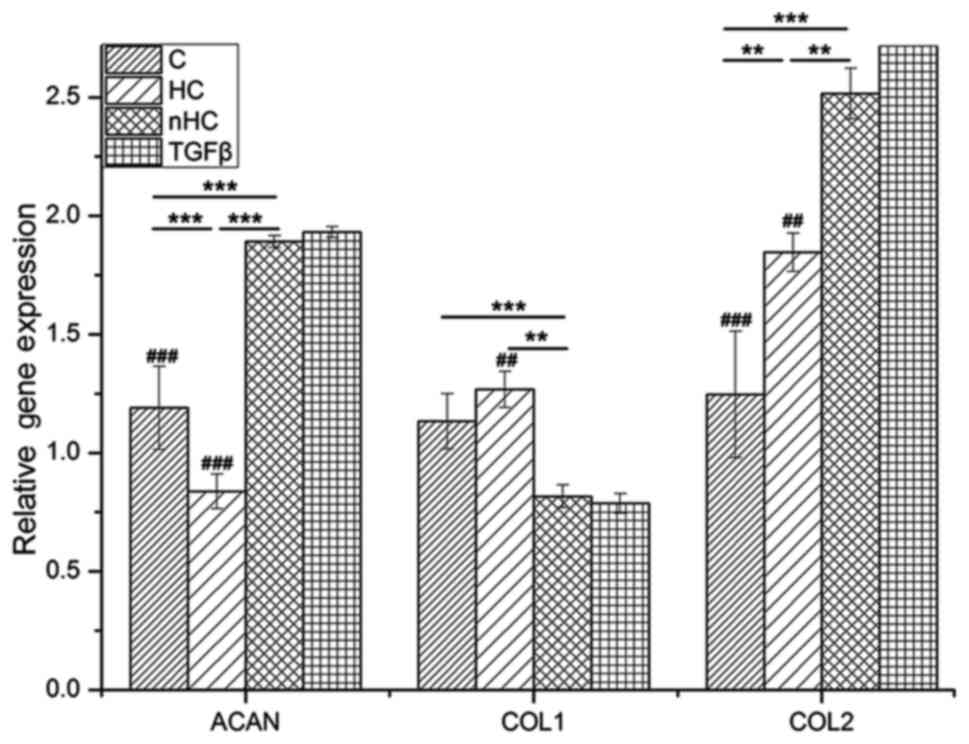|
1
|
Brittberg M, Lindahl A, Nilsson A, Ohlsson
C, Isaksson O and Peterson L: Treatment of deep cartilage defects
in the knee with autologous chondrocyte transplantation. N Engl J
Med. 331:889–895. 1994. View Article : Google Scholar : PubMed/NCBI
|
|
2
|
Chung C and Burdick JA: Engineering
cartilage tissue. Adv Drug Deliv Rev. 60:243–262. 2008. View Article : Google Scholar
|
|
3
|
Lee JI, Sato M, Kim HW and Mochida J:
Transplantatation of scaffold-free spheroids composed of
synovium-derived cells and chondrocytes for the treatment of
cartilage defects of the knee. Eur Cell Mater. 22:275–290. 2011.
View Article : Google Scholar : PubMed/NCBI
|
|
4
|
Vinatier C, Gauthier O, Fatimi A, Merceron
C, Masson M, Moreau A, Moreau F, Fellah B, Weiss P and Guicheux J:
An injectable cellulose-based hydrogel for the transfer of
autologous nasal chondrocytes in articular cartilage defects.
Biotechnol Bioeng. 102:1259–1267. 2009. View Article : Google Scholar
|
|
5
|
Knudson W and Loeser RF: CD44 and integrin
matrix receptors participate in cartilage homeostasis. Cell Mol
Life Sci. 59:36–44. 2002. View Article : Google Scholar : PubMed/NCBI
|
|
6
|
Weber GF, Bjerke MA and DeSimone DW:
Integrins and cadherins join forces to form adhesive networks. J
Cell Sci. 124:1183–1193. 2011. View Article : Google Scholar : PubMed/NCBI
|
|
7
|
Chen X and Gumbiner BM: Crosstalk between
different adhesion molecules. Curr Opin Cell Biol. 18:572–578.
2006. View Article : Google Scholar : PubMed/NCBI
|
|
8
|
Risbud MV and Sittinger M: Tissue
engineering: advances in in vitro cartilage generation. Trends
Biotechnol. 20:351–356. 2002. View Article : Google Scholar : PubMed/NCBI
|
|
9
|
Levorson EJ, Hu O, Mountziaris PM, Kasper
FK and Mikos AG: Cell-derived polymer/extracellular matrix
composite scaffolds for cartilage regeneration, part 2: construct
devitalization and determination of chondroinductive capacity.
Tissue Eng Part C Methods. 20:358–372. 2014. View Article : Google Scholar :
|
|
10
|
Callahan LA, Ganios AM, McBurney DL,
Dilisio MF, Weiner SD, Horton WE Jr and Becker ML: ECM production
of primary human and bovine chondrocytes in hybrid PEG hydrogels
containing type I collagen and hyaluronic acid. Biomacromolecules.
13:1625–1631. 2012. View Article : Google Scholar : PubMed/NCBI
|
|
11
|
Lin Z, Willers C, Xu J and Zheng MH: The
chondrocyte: biology and clinical application. Tissue Eng.
12:1971–1984. 2006. View Article : Google Scholar : PubMed/NCBI
|
|
12
|
Caron MM, Emans PJ, Coolsen MM, Voss L,
Surtel DA, Cremers A, van Rhijn LW and Welting TJ:
Redifferentiation of dedifferentiated human articular chondrocytes:
comparison of 2D and 3D cultures. Osteoarthritis Cartilage.
20:1170–1178. 2012. View Article : Google Scholar : PubMed/NCBI
|
|
13
|
Tekari A, Luginbuehl R, Hofstetter W and
Egli RJ: Chondrocytes expressing intracellular collagen type II
enter the cell cycle and co-express collagen type I in monolayer
culture. J Orthop Res. 32:1503–1511. 2014. View Article : Google Scholar : PubMed/NCBI
|
|
14
|
Mhanna R, Öztürk E, Schlink P and
Zenobi-Wong M: Probing the microenvironmental conditions for
induction of superficial zone protein expression. Osteoarthritis
Cartilage. 21:1924–1932. 2013. View Article : Google Scholar : PubMed/NCBI
|
|
15
|
Luo T and Kiick KL: Collagen-like peptides
and peptide-polymer conjugates in the design of assembled
materials. Eur Polym J. 49:2998–3009. 2013. View Article : Google Scholar : PubMed/NCBI
|
|
16
|
Guo Y, Yuan T, Xiao Z, Tang P, Xiao Y, Fan
Y and Zhang X: Hydrogels of collagen/chondroitin sulfate/hyaluronan
interpenetrating polymer network for cartilage tissue engineering.
J Mater Sci Mater Med. 23:2267–2279. 2012. View Article : Google Scholar : PubMed/NCBI
|
|
17
|
Lee CH, Singla A and Lee Y: Biomedical
applications of collagen. Int J Pharm. 221:1–22. 2001. View Article : Google Scholar : PubMed/NCBI
|
|
18
|
Goo HC, Hwang YS, Choi YR, Cho HN and Suh
H: Development of collagenase-resistant collagen and its
interaction with adult human dermal fibroblasts. Biomaterials.
24:5099–5113. 2003. View Article : Google Scholar : PubMed/NCBI
|
|
19
|
Kino-Oka M, Yashiki S, Ota Y, Mushiaki Y,
Sugawara K, Yamamoto T, Takezawa T and Taya M: Subculture of
chondrocytes on a collagen type I-coated substrate with suppressed
cellular dedifferentiation. Tissue Eng. 11:597–608. 2005.
View Article : Google Scholar : PubMed/NCBI
|
|
20
|
Gillogly SD and Wheeler KS: Autologous
chondrocyte implantation with collagen membrane. Sports Med
Arthrosc Rev. 23:118–124. 2015. View Article : Google Scholar : PubMed/NCBI
|
|
21
|
Hindle P, Hall AC and Biant LC: Viability
of chondrocytes seeded onto a collagen I/III membrane for
matrix-induced autologous chondrocyte implantation. J Orthop Res.
32:1495–1502. 2014. View Article : Google Scholar : PubMed/NCBI
|
|
22
|
Zheng L, Fan HS, Sun J, Chen XN, Wang G,
Zhang L, Fan YJ and Zhang XD: Chondrogenic differentiation of
mesenchymal stem cells induced by collagen-based hydrogel: an in
vivo study. J Biomed Mater Res A. 93:783–792. 2010.
|
|
23
|
Li YY, Cheng HW, Cheung KM, Chan D and
Chan BP: Mesenchymal stem cell-collagen microspheres for articular
cartilage repair: cell density and differentiation status. Acta
Biomater. 10:1919–1929. 2014. View Article : Google Scholar : PubMed/NCBI
|
|
24
|
Li W, Guo R, Lan Y and Zhang Y, Xue W and
Zhang Y: Preparation and properties of cellulose nanocrystals
reinforced collagen composite films. J Biomed Mater Res A.
102:1131–1139. 2014. View Article : Google Scholar
|
|
25
|
Zheng L, Jiang X, Chen X, Fan H and Zhang
X: Evaluation of novel in situ synthesized
nano-hydroxyapatite/collagen/alginate hydrogels for osteochondral
tissue engineering. Biomed Mater. 9:0650042014. View Article : Google Scholar : PubMed/NCBI
|
|
26
|
Laydi F, Rahouadj R, Cauchois G, Stoltz JF
and de Isla N: Hydroxyapatite incorporated into collagen gels for
mesenchymal stem cell culture. Biomed Mater Eng. 23:311–315.
2013.PubMed/NCBI
|
|
27
|
Wang X, Grogan SP, Rieser F, Winkelmann V,
Maquet V, Berge ML and Mainil-Varlet P: Tissue engineering of
biphasic cartilage constructs using various biodegradable
scaffolds: an in vitro study. Biomaterials. 25:3681–3688. 2004.
View Article : Google Scholar : PubMed/NCBI
|
|
28
|
Liang JZ: Reinforcement and quantitative
description of inorganic particulate-filled polymer composites.
Composites Part B Engineering. 51:224–232. 2013. View Article : Google Scholar
|
|
29
|
Fabbri P, Bondioli F, Messori M, Bartoli
C, Dinucci D and Chiellini F: Porous scaffolds of polycaprolactone
reinforced with in situ generated hydroxyapatite for bone tissue
engineering. J Mater Sci Mater Med. 21:343–351. 2010. View Article : Google Scholar
|
|
30
|
Livak and Schmittgen: Analysis of relative
gene expression data using real-time quantitative PCR and the
2-ΔΔCt method. Methods. 25:402–408. 2001. View Article : Google Scholar
|
|
31
|
Yashiki S, Umegaki R, Kino-Oka M and Taya
M: Evaluation of attachment and growth of anchorage-dependent cells
on culture surfaces with type I collagen coating. J Biosci Bioeng.
92:385–388. 2001. View Article : Google Scholar
|
|
32
|
Nixon AJ, Rickey E, Butler TJ, Scimeca MS,
Moran N and Matthews GL: A chondrocyte infiltrated collagen type
I/III membrane (MACI® implant) improves cartilage
healing in the equine patellofemoral joint model. Osteoarthritis
Cartilage. 23:648–660. 2015. View Article : Google Scholar : PubMed/NCBI
|
|
33
|
Smeriglio P, Dhulipala L, Lai JH, Goodman
SB, Dragoo JL, Smith RL, Maloney WJ, Yang F and Bhutani N: Collagen
VI enhances cartilage tissue generation by stimulating chondrocyte
proliferation. Tissue Eng Part A. 21:840–849. 2015. View Article : Google Scholar
|
|
34
|
Jia L, Duan Z, Fan D, Mi Y, Hui J and
Chang L: Human-like collagen/nano-hydroxyapatite scaffolds for the
culture of chondrocytes. Mater Sci Eng C. 33:727–734. 2013.
View Article : Google Scholar
|
|
35
|
Hunter KT and Ma T: In vitro evaluation of
hydroxyapatite-chitosan-gelatin composite membrane in guided tissue
regeneration. J Biomed Mater Res A. 101:1016–1025. 2013. View Article : Google Scholar
|
|
36
|
Chen J, Yu Q, Zhang G, Yang S, Wu J and
Zhang Q: Preparation and biocompatibility of nanohybrid scaffolds
by in situ homogeneous formation of nano hydroxyapatite from
biopolymer polyelectrolyte complex for bone repair applications.
Colloids Surf B Biointerfaces. 93:100–107. 2012. View Article : Google Scholar : PubMed/NCBI
|
|
37
|
Chen J, Zhang G, Yang S, Li J, Jia H, Fang
Z and Zhang Q: Effects of in situ and physical mixing on mechanical
and bioactive behaviors of nano hydroxyapatite-chitosan scaffolds.
J Biomater Sci Polym Ed. 22:2097–2106. 2011. View Article : Google Scholar
|
|
38
|
Zhang CY, Lu H, Zhuang Z, Wang XP and Fang
QF: Nano-hydroxyapatite/poly(L-lactic acid) composite synthesized
by a modified in situ precipitation: preparation and properties. J
Mater Sci Mater Med. 21:3077–3083. 2010. View Article : Google Scholar : PubMed/NCBI
|
|
39
|
Chen J, Nan K, Yin S, Wang Y, Wu T and
Zhang Q: Characterization and biocompatibility of nanohybrid
scaffold prepared via in situ crystallization of hydroxyapatite in
chitosan matrix. Colloids Surf B Biointerfaces. 81:640–647. 2010.
View Article : Google Scholar : PubMed/NCBI
|
|
40
|
Zhu W, Chen K, Lu W, Sun Q, Peng L, Fen W,
Li H, Ou Y, Liu H, Wang D, et al: In vitro study of nano-HA/PLLA
composite scaffold for rabbit BMSC differentiation under TGF-β1
induction. In Vitro Cell Dev Biol Anim. 50:214–220. 2014.
View Article : Google Scholar
|















